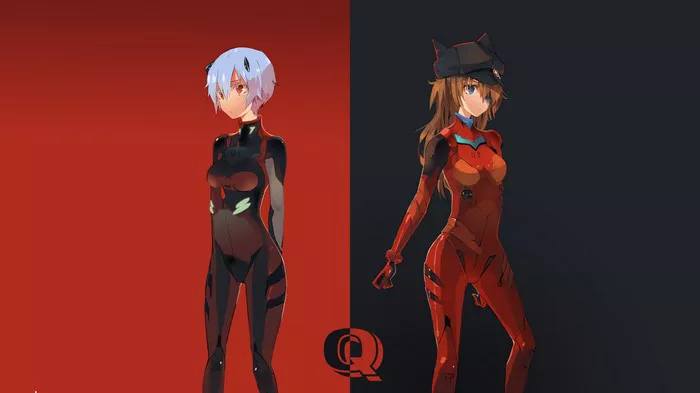Neon Genesis Evangelion, a seminal anime series that debuted in the mid-1990s, is often hailed as a groundbreaking work of animation that pushed the boundaries of the medium. However, despite its widespread acclaim and devoted fanbase, Neon Genesis Evangelion has also faced its fair share of criticism and controversy. In this article, we delve into the reasons why Neon Genesis Evangelion is perceived by some as a flawed or problematic work, analyzing its themes, characters, and narrative choices to shed light on the complexities of its reception.
The Cultural Phenomenon: A Brief Overview
Before delving into the critique, let us first provide a brief overview of Neon Genesis Evangelion and its cultural significance.
Neon Genesis Evangelion, created by Hideaki Anno and produced by Gainax, follows the story of Shinji Ikari, a young boy who is recruited by the paramilitary organization NERV to pilot giant robots known as Evangelions to combat mysterious beings called Angels. As the series unfolds, it explores themes of existentialism, identity, trauma, and the nature of consciousness, weaving a complex and thought-provoking narrative that captivated audiences around the world.
Upon its release, Neon Genesis Evangelion garnered widespread acclaim for its innovative storytelling, stunning animation, and deep psychological themes. However, as time has passed, the series has also come under scrutiny for its portrayal of characters, handling of sensitive subject matter, and controversial narrative choices.
Critique of Characterization: Flawed Protagonists and Supporting Cast
One of the primary criticisms leveled against Neon Genesis Evangelion revolves around its characterization, particularly the portrayal of its protagonists and supporting cast. Critics argue that many of the characters in the series are poorly developed, lacking depth and complexity beyond their initial archetypes.
At the center of this critique is Shinji Ikari, the series’ protagonist, whose passive and introspective nature has been a point of contention for many viewers. Critics argue that Shinji’s portrayal as a reluctant hero who constantly grapples with feelings of inadequacy and self-doubt can be frustrating and off-putting, detracting from his effectiveness as a central figure.
Similarly, other characters in Neon Genesis Evangelion, such as Asuka Langley Soryu and Rei Ayanami, have also been criticized for their one-dimensional characterization and lack of agency within the narrative. Critics argue that these characters often serve as little more than plot devices or romantic foils for Shinji, failing to receive the depth and development they deserve.
Deconstruction of Mecha Tropes: Subversion or Misstep?
Neon Genesis Evangelion is often celebrated for its deconstruction of traditional mecha anime tropes, subverting audience expectations and challenging the conventions of the genre. However, some critics argue that the series’ attempts to deconstruct these tropes can come across as heavy-handed or self-indulgent, detracting from the overall narrative cohesiveness.
One common critique is the series’ portrayal of the Eva pilots as psychologically damaged individuals who struggle to cope with the pressures of piloting giant robots. While this exploration of trauma and mental health issues is commendable, some critics argue that the series’ treatment of these themes can be sensationalized or exploitative, relying on shock value rather than genuine emotional resonance.
Additionally, Neon Genesis Evangelion’s surreal and abstract storytelling style has been a point of contention for some viewers, who argue that the series’ narrative becomes increasingly convoluted and inaccessible as it progresses. Critics argue that the series’ reliance on cryptic symbolism and esoteric imagery can alienate audiences and obscure its underlying themes, resulting in a frustrating viewing experience for many.
Controversy Surrounding the Ending: Ambiguity or Betrayal?
One of the most controversial aspects of Neon Genesis Evangelion is its ending, which has divided audiences since its original broadcast. The series’ final episodes, often referred to as the “End of Evangelion,” eschew traditional narrative structure in favor of a surreal and abstract exploration of existential themes and philosophical concepts.
While some viewers praise the ending for its boldness and artistic ambition, others criticize it for its perceived lack of closure and resolution. Critics argue that the series’ conclusion leaves many questions unanswered and fails to provide a satisfying payoff for the narrative buildup that precedes it.
Additionally, the ending of Neon Genesis Evangelion has been criticized for its perceived ambiguity and obfuscation of meaning. Critics argue that the series’ refusal to provide definitive answers or explanations for its many mysteries can be frustrating and unsatisfying, leaving audiences feeling bewildered and dissatisfied with the overall resolution.
Conclusion
In conclusion, Neon Genesis Evangelion is a complex and multifaceted work that has elicited a wide range of reactions from audiences since its debut. While many viewers praise the series for its innovative storytelling, thought-provoking themes, and stunning animation, others criticize it for its flawed characterization, controversial narrative choices, and ambiguous ending.
Ultimately, whether one views Neon Genesis Evangelion as a masterpiece or a misstep is largely subjective, shaped by personal preferences and individual interpretations of the series’ themes and motifs. Regardless of one’s stance, there is no denying the lasting impact and cultural significance of Neon Genesis Evangelion, which continues to inspire debate and discussion among fans and critics alike.

